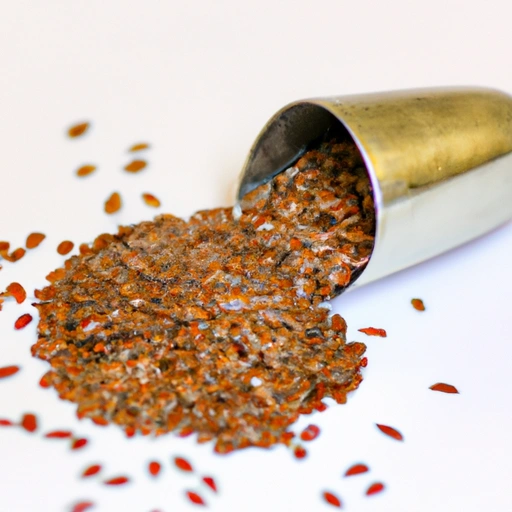Flax Seed
Description

Flax seed, also known as linseed, is a nutrient-dense ingredient that has been valued for both its health benefits and culinary versatility for centuries. Small, brown, or golden seeds from the flax plant, Linum usitatissimum, flax seeds can be consumed whole, ground into meal, or pressed to produce flaxseed oil. Recognized for their rich content of dietary fiber, omega-3 fatty acids, and lignans, these seeds are a staple in health-conscious diets around the globe.
Common uses
Flax seeds are often added to breakfast cereals, smoothies, and yogurt for an added nutritional boost. They are also used as a vegan egg substitute in baking by mixing ground flax seed with water to create a 'flax egg.'
Nutritional value
Calories
One tablespoon (7 grams or 0.25 oz) of ground flax seed provides approximately 37 calories.
Protein
Flax seeds contain about 1.3 grams (0.045 oz) of protein per tablespoon.
Fat
Each tablespoon of flax seed has about 3 grams (0.1 oz) of fat, the majority of which is heart-healthy polyunsaturated fat, including omega-3 fatty acids.
Carbohydrates
There are about 2 grams (0.07 oz) of carbohydrates in a tablespoon of ground flax seed, most of which is dietary fiber.
Vitamins
Flax seeds are a good source of B vitamins, particularly vitamin B1 (thiamine) and B6 (pyridoxine).
Minerals
These seeds are also rich in minerals such as magnesium, phosphorus, and manganese.
Health benefits
Regular consumption of flax seed is linked to numerous health benefits, including improved digestive health, reduced risk of heart disease, and lower cholesterol levels. The high concentration of alpha-linolenic acid (ALA), a plant-based omega-3 fatty acid, in flax seed, may also contribute to reduced inflammation and improved brain function.
Potential risks
While flax seeds are generally safe for most people, they contain phytoestrogens, which can affect hormone levels if consumed in large quantities. Additionally, individuals with a tendency to form blood clots or those taking blood-thinning medications should consult with a healthcare provider before incorporating flax seeds into their diet, due to their blood-thinning properties.
Common recipes
Flax seeds are commonly used to make flaxseed meal, which can be used in recipes for muffins, bread, and pancakes. They are also a popular ingredient in granola, energy bars, and as a topping for salads and soups.
Cooking methods
Flax seeds can be eaten raw, roasted, or used as an oil. To increase their digestibility and nutrient absorption, it is often recommended to consume flax seeds in ground form rather than whole.
Pairing with other ingredients
Due to their nutty flavor, flax seeds pair well with nuts, fruits, and other seeds. They complement both sweet and savory dishes and can be used to add texture and nutrition to a variety of recipes.
Summary
Flax seed is an ancient superfood that offers a plethora of health benefits and culinary applications. With its impressive nutritional profile, including high levels of omega-3 fatty acids, dietary fiber, and lignans, flax seed is a versatile ingredient that can enhance the nutritional value of many dishes. Although it is generally safe for most people, it is important to be aware of its potential risks and consume it in moderation.